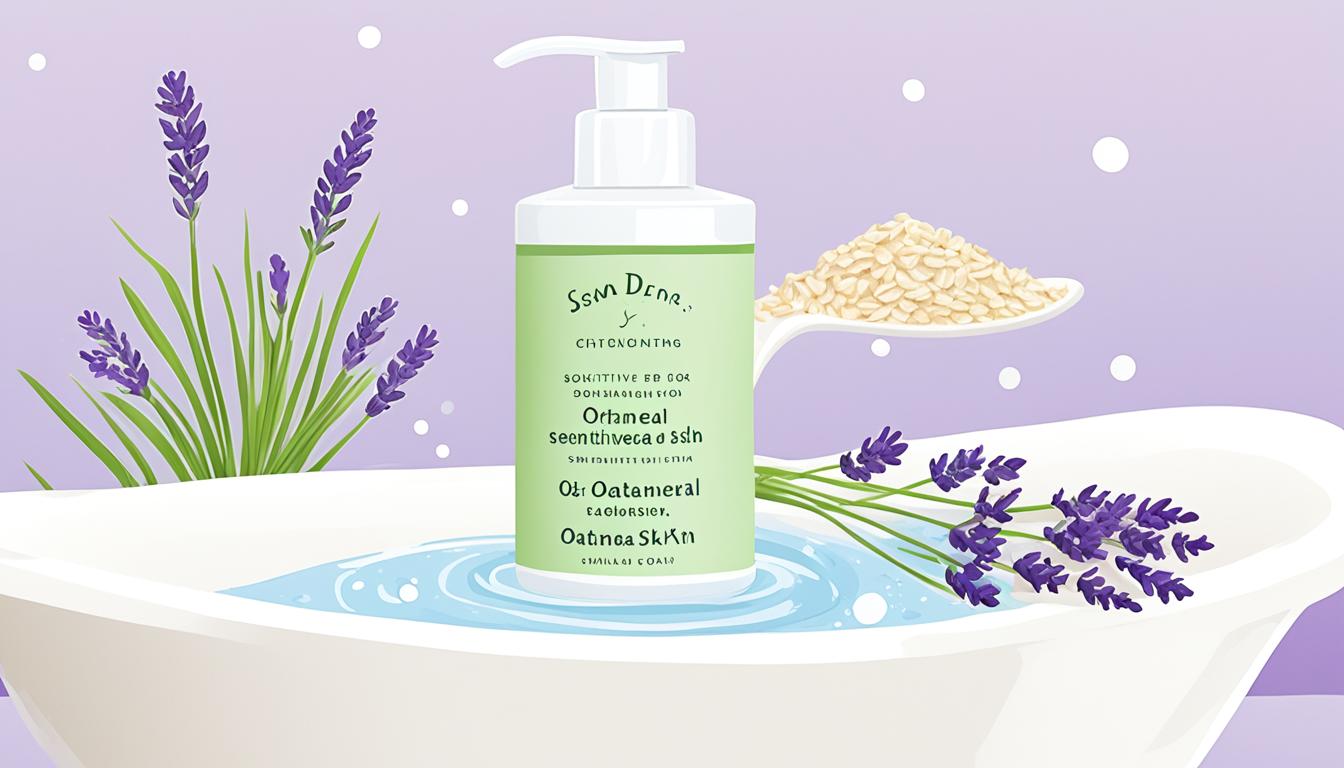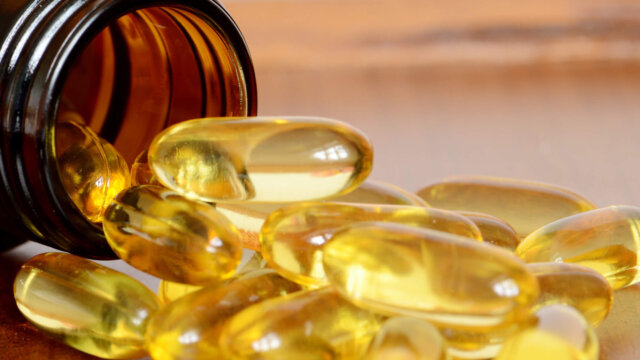FTC disclaimer: This post may contains affiliate links and we will be compensated if you click on a link and make a purchase.
Did you know 99.3% of people with sensitive skin find it hard to find gentle skincare products? This fact shows how important it is to use natural remedies for sensitive skin. This guide will give you gentle tips and home remedies to care for your skin.
Sensitive skin can be tough, but you can get a healthy glow with the right steps. We’ll look at things like sea buckthorn oil and flaxseed oil. These natural ingredients and simple remedies will help you make your skin look and feel better.
Key Takeaways
- Learn about natural ingredients like sea buckthorn, olive oil, and raw milk for sensitive skin.
- Find out how to make a skincare routine that’s gentle and doesn’t have strong smells.
- See effective home remedies for sensitive skin issues like eczema and acne
- Understand why protecting your skin from the sun and avoiding harsh ingredients is key
- Discover how diet and managing stress help keep sensitive skin healthy and bright
Understanding Sensitive Skin
Sensitive skin is complex and can show up in many ways, like dryness, irritation, oiliness, or acne. To tackle sensitive skin, knowing the types and figuring out your skin type is key.
Types of Sensitive Skin
There are different kinds of sensitive skin, like dry, oily, or both. Dry skin might feel tight, itch a bit, and show flakes or cracks. Oily skin can have too much oil, big pores, and breakouts. Some have both dry and oily areas, like the T-zone.
Identifying Your Skin Type
Figuring out your skin type means watching how it reacts to products and the environment. Signs of sensitive skin include redness, swelling, and itchiness. Knowing what makes your skin react can help you pick the right home remedies and skincare.
Understanding your sensitive skin type helps you customize your skincare. Rebeaut offers products just for sensitive skin, which is a great start for caring for your skin.

“Sensitive skin can occur in individuals due to genetic differences in the normal protective skin barrier or severe skin irritation causing inflammation.”
Gentle Cleansing Routine
For sensitive skin, a gentle cleansing routine is key. Harsh chemicals and fragrances can make things worse. It’s best to use mild, fragrance-free cleansers made for sensitive skin.
Choosing a Mild Cleanser
Look for cleansers without fragrances, alcohol, and harsh exfoliants. Rebeaut’s Sensitive Skin Facewash is great for sensitive skin. It cleanses gently without harming your skin’s natural barrier.
Proper Cleansing Techniques
Using lukewarm water and gentle pats with a soft towel is best for your face. Clean your face only twice a day to avoid over-cleansing.
These gentle methods help remove dirt and oil without drying out your skin. This makes cleansing soothing and nourishing for sensitive skin.
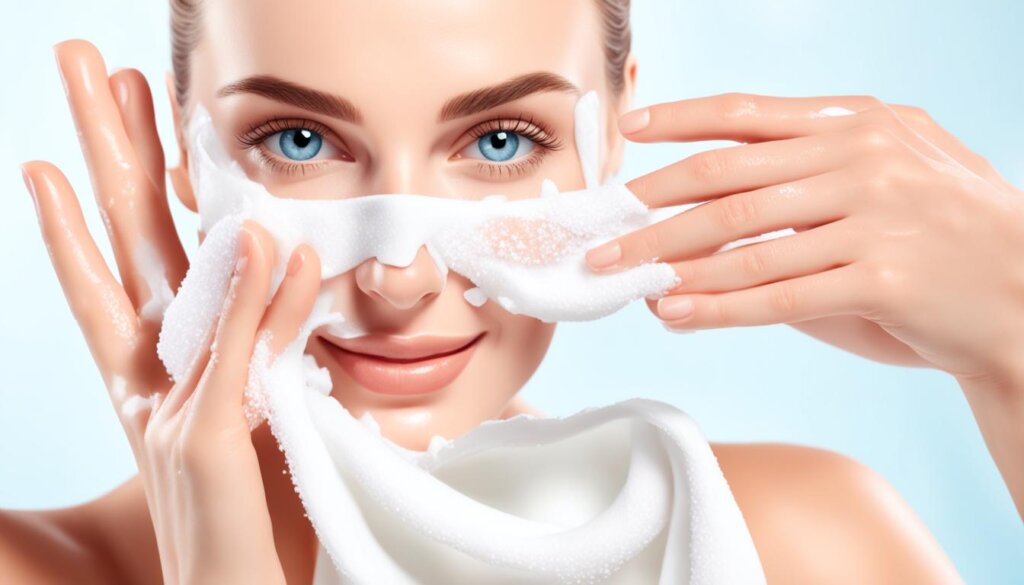
Ingredient to Avoid | Reason |
|---|---|
Fragrances | Can cause irritation and allergic reactions in sensitive skin |
Alcohols | Can be drying and disrupt the skin’s natural barrier |
Physical Exfoliants | Can be too harsh and cause micro-tears in sensitive skin |
Sulfates | Can strip the skin’s natural oils and lead to dryness and irritation |
“Gentle, fragrance-free cleansers are essential for sensitive skin care to avoid further irritation from harsh chemicals or abrasives.”
Hydrating and Moisturizing Sensitive Skin
It’s key to keep your skin hydrated and moisturized for its health and to stop sensitivity. You might need different moisturizers or ways to hydrate based on your skin type. For dry sensitive skin, use oil-based, fragrance-free moisturizers with ingredients like hyaluronic acid and ceramides. For oily sensitive skin, go for non-comedogenic, water-based moisturizers to keep skin moist without clogging pores. For combination sensitive skin, pick targeted moisturizers for certain face areas to balance moisture.
Adding natural, hydrating ingredients to your skincare can really help sensitive skin. Studies show that sunflower seed oil, milk, honey, petroleum jelly, aloe vera, coconut oil, and oatmeal can make skin more hydrated, heal faster, and reduce inflammation.
To keep your skin healthy and moist, avoid things that make it dry and sensitive. This includes cold weather, harsh soaps, hot water, and over-exfoliating. By using gentle, nourishing moisturizers and watching out for environmental factors, you can keep your sensitive skin happy and healthy.
Skin Type | Recommended Moisturizers |
|---|---|
Dry Sensitive Skin | Oil-based, fragrance-free moisturizers with hydrating ingredients like hyaluronic acid and ceramides |
Oily Sensitive Skin | Non-comedogenic, water-based moisturizers |
Combination Sensitive Skin | Targeted moisturizers for specific areas of the face to balance hydration levels |
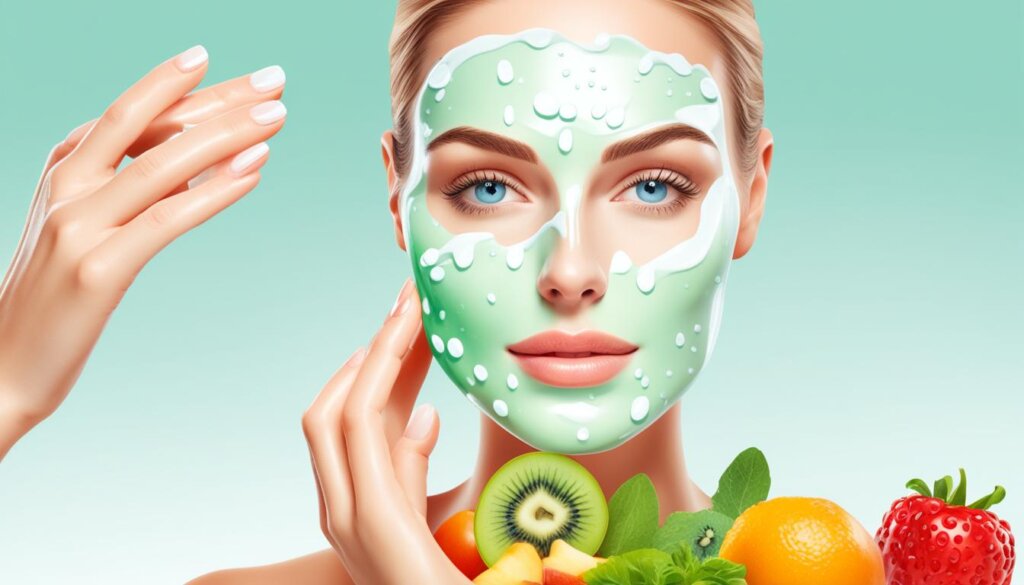
“Keeping your skin well-hydrated and moisturized is essential for maintaining its health and preventing sensitivity.”
Home Remedies for Sensitive Skin with Pimples
Dealing with acne is tough for those with sensitive skin. Many treatments can make things worse. But, there are natural home remedies that can help. They can reduce breakouts and soothe sensitive skin.
Tea Tree Oil
Tea tree oil is strong against acne-causing bacteria. Mix it with a carrier oil like jojoba or almond oil. Then, put it on pimples to lessen inflammation and heal faster. A 2019 study showed it can cut down acne spots by fighting germs.
Honey
Raw honey fights bacteria and reduces swelling. Put a thin honey layer on pimples for 10-15 minutes before washing. It helps calm irritation and heal the skin.
Aloe Vera
Aloe vera is great for sensitive skin with acne. Its cooling gel can be applied to pimples to lessen redness and swelling. A 2021 study found it helped reduce bumps, spots, and dry skin.
Using these natural remedies can help fight acne without irritating your skin. Always test new ingredients on a small area first. If your acne doesn’t get better, see a dermatologist.
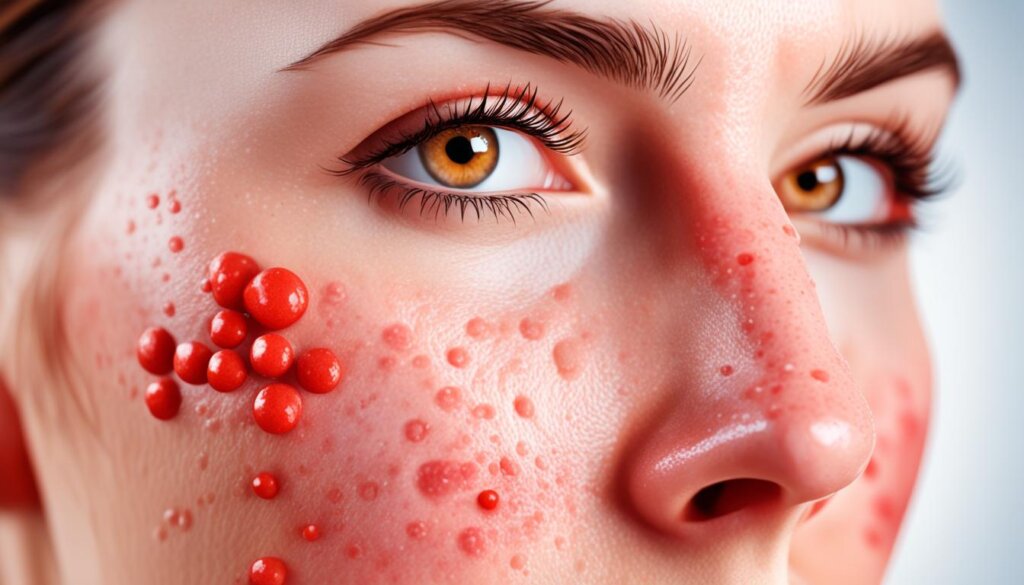
Home Remedies for Glowing Sensitive Skin
If you have sensitive skin, finding products that don’t irritate can be tough. But, there are natural home remedies that can give you a radiant glow. These remedies won’t make your skin worse.
Yogurt and Honey Mask
Yogurt has lactic acid, a gentle exfoliant that removes dead skin cells. Honey adds hydration and soothes your skin. Mix equal parts yogurt and honey, put it on your face, and wait 15-20 minutes. Then, rinse with lukewarm water. This mask makes your skin soft, supple and refreshed.
Cucumber and Aloe Vera Mask
Cucumber and aloe vera cool and calm sensitive skin. Blend a peeled cucumber and mix it with aloe vera gel. Apply it to your face and wait 15-20 minutes before rinsing. This mask soothes and hydrates your skin.
Oatmeal and Milk Mask
Oatmeal gently exfoliates and soothes, while milk hydrates and brightens. Mix equal parts oatmeal and milk to make a paste. Apply it to your face and wait 15-20 minutes before rinsing. This mask calms inflammation and makes your skin soft and radiant.
Always test new remedies on a small area before using them on your whole face. This way, you can avoid irritation. With some trial, you’ll find the best natural solutions for a glowing complexion.
Sun Protection for Sensitive Skin
Keeping sensitive skin safe from the sun is key. It can cause irritation, make skin age too fast, and increase skin cancer risk. Broad-spectrum sunscreen with SPF 30 or higher is a must for sensitive skin. Choose mineral-based ones with zinc oxide or titanium dioxide to avoid irritation.
Wearing protective clothes also helps shield your skin from the sun. Use wide-brimmed hats, sunglasses with UV protection, and light, long-sleeved clothes.
- Stay out of the sun during the peak hours, from 10 a.m. to 2 p.m., when the sun’s rays are strongest.
- Put on sunscreen every two hours, or more if you’re swimming or sweating.
- Use antioxidant-rich items like turmeric in your skincare to fight environmental damage.
Sensitive skin is more at risk for sun damage. So, be careful and focus on sun protection to keep your skin healthy and glowing.
“Protecting your sensitive skin from the sun is key. It helps prevent irritation, early aging, and skin cancer risk. Use a good, broad-spectrum sunscreen and protective clothes for a healthy, bright look.”
Avoiding Irritating Ingredients
When taking care of sensitive skin, pay close attention to what’s in your products. If you have sensitive skin, you might get redness, swelling, and uneven skin color. This can happen if you react to chemicals, dyes, or scents in products. Things like allergies can cause rashes or irritation.
For sensitive skin, choose products without scents and that are made for those with allergies. Stay away from harsh chemicals like bleach, alcohol, and ammonia to avoid irritation. Don’t use products with dyes, scents, deodorants, or antibacterial stuff either, as they can make things worse.
Try a 72-hour patch test on new products to see if you react to them. Be careful with exfoliating and rough scrubs, as they can make sensitive skin worse. Instead, use gentle stuff like urea, lactic acid, shea butter, or coconut oil to calm and moisturize your skin.
Ingredient to Avoid | Reason for Sensitivity |
|---|---|
Fragrances | Often trigger allergic reactions and irritation |
Alcohol | Can strip the skin of its natural oils, leading to dryness and irritation |
Harsh Chemicals (e.g., bleach, ammonia) | Disrupt the skin’s protective barrier and cause inflammation |
Dyes | May contain irritating synthetic colorants |
Deodorants | Can irritate sensitive underarm skin |
Antibacterial Ingredients | Can be too harsh and disrupt the skin’s natural microbiome |
Avoid these irritants and choose gentle, scent-free, hypoallergenic products to help your sensitive skin. Always talk to a dermatologist to find the best skincare routine for your skin type and needs.
The Role of Diet in Sensitive Skin Health
Eating well is key to keeping your sensitive skin healthy and looking good. Eating a mix of foods that are good for your skin gives it what it needs to stay healthy and fight sensitivity.
Studies show that eating foods with fish oil or taking fish oil supplements can make your skin look younger. Adding fruits and veggies full of antioxidants to your meals can protect your skin from harm and slow down aging.
For oily skin, eating less oily and processed foods and sugar is good. Drinking lots of water and eating foods like watermelon can help keep dry skin moist.
Probiotics in foods like Greek yogurt can help with acne without cutting out important nutrients. Eating foods rich in collagen, like eggs and fish, can help your body make more collagen. This slows down skin aging.
A diet full of Nutrition for Skin Health, Skin-Nourishing Foods, and Balanced Diet is great for your sensitive skin’s health. Choosing foods that are right for your skin type can make your skin glow and be less sensitive.
“Eating a healthy diet consisting of fruits, vegetables, whole grains, and lean proteins can contribute to overall skin health.” –
Skin Type | Dietary Recommendations |
|---|---|
Oily Skin | Limit oily, ultra-processed foods; Reduce added sugar intake to less than 10% per day |
Dry Skin | Drink 2 liters of water per day; Incorporate hydrating foods like watermelon |
Combination Skin | Integrate meal plans for both dry and oily skin types; Pay attention to grains and wheat consumed |
Acne-Prone Skin | Incorporate probiotic-rich foods like Greek yogurt |
Aging Skin | Consume collagen-rich foods such as eggs, fish, and lean meats |
It’s important to tailor your diet and skincare to your skin’s needs. Making smart food choices and adding the right Nutrition for Skin Health can make your skin look great and be less sensitive.
Stress Management for Sensitive Skin
Stress can really hurt your skin’s health, making it more sensitive and causing other skin problems. To keep your skin looking good, it’s key to reduce stress. Try yoga, meditation, and exercise to help your sensitive skin.
Yoga and meditation calm you down and help your skin stay calm too. Meditation brings peace inside you, which is good for your skin. And, exercise boosts your health and keeps your skin stress-free.
Adding these stress-lowering activities to your day can make your skin look better. Remember, stress and skin health are closely linked. So, managing stress can really help your sensitive skin.
“Stress can wreak havoc on our skin, but by embracing natural stress management practices, we can reclaim our skin’s health and glow.”
It’s important to find what stress relief works for you, like yoga, meditation, or deep breaths. Taking care of your mind and body leads to better, happier skin.
- Incorporate a daily yoga or meditation practice to calm the mind and body.
- Engage in regular exercise, such as brisk walking, swimming, or cycling, to manage stress levels.
- Practice deep breathing exercises whenever you feel overwhelmed to help soothe your sensitive skin.
Managing stress is key to keeping your sensitive skin healthy and glowing. Use a mix of stress-lowering activities and skincare tips for a radiant look.
Home Remedies for Sensitive Skin
If you have sensitive skin, finding products that don’t irritate can be tough. Luckily, there are natural home remedies that can help. From sea buckthorn oil to camellia tea oil, these gentle solutions can soothe and nourish your skin.
Sea Buckthorn Oil
Sea buckthorn oil comes from the sea buckthorn plant. It’s full of vitamins, minerals, and antioxidants that help with skin rejuvenation. To use, put a few drops on the skin and massage it in. Let it sit for 30 minutes before washing off with lukewarm water.
Camellia Tea Oil
Camellia tea oil is great for skin rejuvenation. Put a few drops on the skin and massage it in. Leave it on overnight for deep moisturization.
Hemp Seed Oil
Hemp seed oil comes from hemp seeds and is full of essential fatty acids. Massage a few drops onto the skin and let it sit for 20-30 minutes before washing off with warm water.
Jojoba Oil
Jojoba oil is like your skin’s natural oils, making it perfect for sensitive skin. It won’t clog pores. Warm some oil in your hands, then massage it into the skin until absorbed. Leave it on overnight for deep moisturization.
Raw Milk
Raw milk has natural fats, proteins, and lactic acid that moisturize and exfoliate the skin. Soak a cloth in raw milk, apply it to the skin, and leave it on for 10-15 minutes. Rinse with cool water. Use this once a day. But avoid it if you’re allergic to dairy.
Amla (Indian Gooseberry)
Amla, or Indian gooseberry, is full of vitamin C and antioxidants. Mix amla powder with water to make a paste. Apply it to the skin and let it sit for 20-30 minutes. Rinse with lukewarm water and pat dry. Do this two to three times a week.
Olive Oil
Olive oil is packed with fatty acids and antioxidants for skin hydration. Warm some oil in your hands, massage it into the skin, and leave it on for 30 minutes before washing off with lukewarm water.
Avocado Oil and Fruit
Avocado oil helps with skin hydration and barrier function. Apply a few drops and massage it in. Leave it on for 20-30 minutes before washing off with warm water. Or, mash a ripe avocado and apply it to the skin for 15-20 minutes. Rinse with cool water and dry the skin. Do this two to three times a week for hydration and soothing.
Linseed (Flaxseed)
Linseed, or flaxseed, has anti-inflammatory benefits for eczema and skin issues. Add flaxseed oil to your cooking or salads.
Tea Bags
Tea bags like chamomile or green tea have soothing and anti-inflammatory properties. Steep them in hot water, let them cool, then apply them to the skin. Leave them on for 10-15 minutes, then rinse with cool water.
“Home remedies can be a gentle and effective way to soothe sensitive skin, but it’s important to pay attention to your individual reactions and seek medical advice if home treatments don’t provide relief.”
Conclusion
Following sensitive skin home remedies and natural approaches can help you manage your skin issues. This leads to healthy, glowing skin. In the U.S., more people are turning to alternative medicine, like herbal therapies, than to regular doctors in 1997. This shows how people want natural solutions over chemical drugs.
If your skin problems don’t get better, see a dermatologist for help. Always test new skincare products on a small area first. This is because some products can make sensitive skin worse. Using moisturizers with Ceramides and stem cells can also help repair and hydrate your skin.
By using these tips and natural remedies, you can get a healthy, glowing look. Make sure to talk to a dermatologist for advice on what’s best for your skin type and issues.
FAQ
What are the different types of sensitive skin?
Sensitive skin can be dry, oily, or both. Dry skin feels tight and itchy. Oily skin has too much oil and big pores. Some skin is both dry and oily, like the T-zone.
How can I determine my skin type?
Watch how your skin reacts to products and the environment. This helps you pick the right care for your skin type.
What are some gentle cleansing tips for sensitive skin?
Be gentle when cleaning your skin to avoid more irritation. Avoid harsh chemicals and strong smells. Use mild, fragrance-free cleansers made for sensitive skin. Wash your face with lukewarm water, don’t rub, and pat dry with a soft towel.
How can I keep my sensitive skin hydrated and moisturized?
Keeping your skin moisturized is key for its health and sensitivity. Use different moisturizers based on your skin type. For dry skin, try oil-based moisturizers with ingredients like hyaluronic acid. For oily skin, use water-based ones to keep pores clear. For mixed skin, use targeted moisturizers for each area.
What are some home remedies for sensitive skin with pimples?
Tea tree oil fights acne-causing bacteria. Mix it with a carrier oil and apply it to pimples. Honey helps reduce acne and soothes skin. Apply it to pimples and rinse after 10-15 minutes. Aloe vera also helps with acne and calms the skin. Use pure aloe vera gel on pimples and let it dry.
What are some home remedies for glowing sensitive skin?
Yogurt and honey can exfoliate and moisturize your skin. Mix them, apply to your face, and rinse after 15-20 minutes. Cucumber and aloe vera soothe and brighten your skin. Blend cucumber and mix with aloe vera gel, apply, and rinse after 15-20 minutes. Oatmeal and milk can exfoliate and hydrate. Make a paste with oatmeal and milk, apply, and rinse after 15-20 minutes.
How can I protect my sensitive skin from sun damage?
Sensitive skin can easily get sunburned, leading to damage and skin cancer risk. Always use a broad-spectrum sunscreen with SPF 30 and wear protective clothes.
What ingredients should I avoid in my skincare products for sensitive skin?
Some skincare ingredients can irritate sensitive skin. Avoid fragrances, harsh chemicals, and alcohol. Choose products without fragrances and made for sensitive skin.
How can diet and stress management affect sensitive skin?
Eating well is important for your skin’s health. Eat fruits, veggies, whole grains, lean proteins, and healthy fats. Stress can make skin worse. Try yoga, meditation, deep breathing, and exercise to keep your skin healthy.
What are some other home remedies for sensitive skin?
Sea buckthorn oil, camellia tea oil, hemp seed oil, jojoba oil, raw milk, amla, olive oil, avocado oil, linseed, and tea bags can help sensitive skin. They soothe, moisturize, and reduce inflammation.
